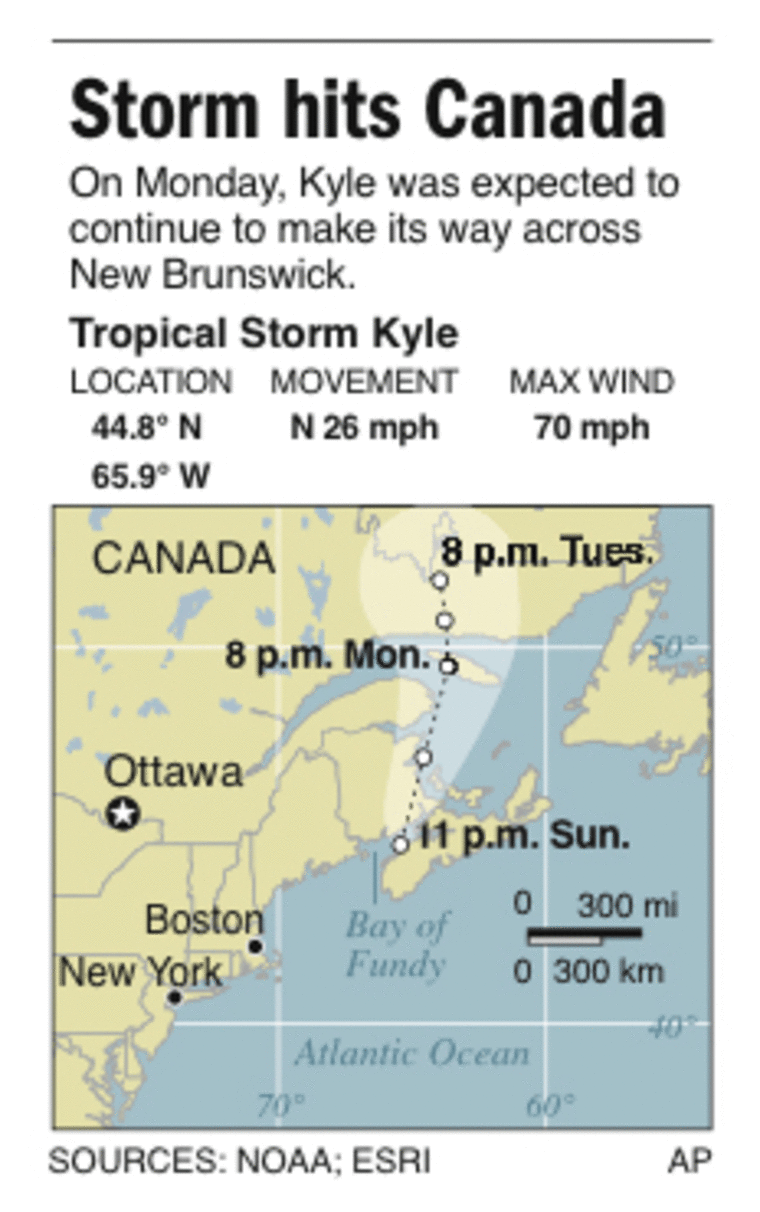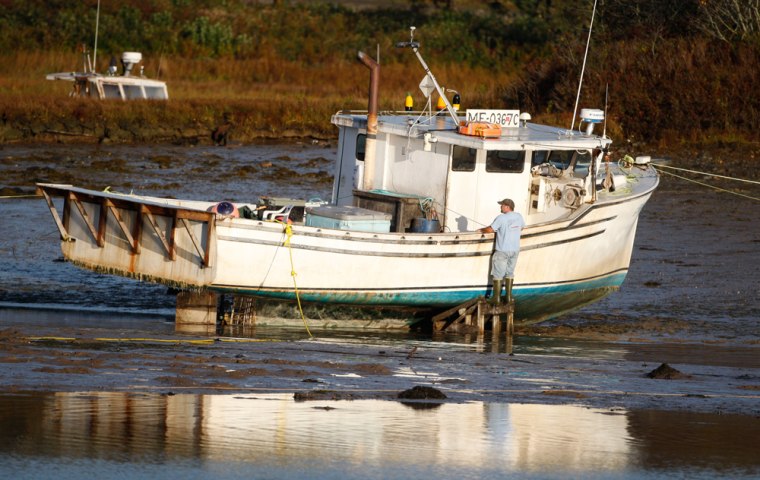Hurricane Kyle weakened to a post-tropical storm as it swept across the Canadian Maritimes, but high winds and heavy rains continued to buffet Nova Scotia and New Brunswick early Monday and thousands were left without electricity.
Kyle had weakened significantly since making landfall near Yarmouth, Nova Scotia, on Sunday and was working its way east, said meteorologist Stephen Hatt with the National Hurricane Centre in Halifax.
Despite the downgrade, Hatt said Kyle was still packing strong winds gusting to between 50 mph and 62 mph, down from 74 mph — the threshold for hurricane strength — that was registered during the storm's peak as it hit Canada.
The storm delivered little more than a glancing blow to the northeastern U.S. Saturday.
Damage from Sunday's tropical storm left thousands in Canada without power, Hatt said.
"All of New Brunswick is still getting a little bit of rain, but it's starting to wind down," Hatt said, adding that much of Nova Scotia and parts of Prince Edward Island may have to contend with Kyle's remnants throughout the day. He said the center had not received any reports of injuries or casualties so far.
Impact less than expected
Bob Robichaud of the National Hurricane Centre said it first struck Canada as a marginal hurricane before quickly weakening. Robichaud said by midmorning, almost all the weather warnings had ended and most of the rain had moved offshore.
The storm lost strength as it moved over cold water off Nova Scotia.
Winds were responsible for much of the damage incurred Sunday, according to officials with provincial power utilities.
Glennie Langille, spokeswoman for Nova Scotia Power, said toppled trees and downed power lines have left 14,000 customers without electricity across the province. She said crews working through the night have managed to restore power for 25,000 residents and that fresh workers would be taking over at daybreak.
Despite the power outages and tree damage, the storm's impact was considerably less than many expected.
The storm arrived on the eve of the fifth anniversary of Hurricane Juan, a Category 2 storm that killed at least two people and caused an estimated $100 million in damage.
"They are not unheard of. The last one to make landfall was Juan back in 2003," Robichaud said. "We do get them every couple of years or so."
Boats moved in Maine
Fishermen moved boats to shelter from a rare burst of tropical weather along Maine's rugged eastern coast Sunday, delivering a glancing blow equivalent to a classic nor'easter that made locals yawn.
As darkness fell, the storm produced winds hard enough to jiggle road signs, cause scattered power outages and rip early-autumn leaves from trees while lashing the Maine coast with a third straight day of heavy rain. Flooding closed roads as the storm sped up the Bay of Fundy, which separates Maine and New Brunswick from Nova Scotia.
Maine emergency responders had braced for wind gusts as high as 60 mph and waves up to 20 feet, but as the storm edged eastward it became clear that the state had escaped a direct hit.
"This was a run-of-the-mill storm. It had the potential to be a real problem and it all sort of went away. That shift to the east did wonders for Maine," said Michael Hinerman, director of the Washington County Emergency Management Agency.

Officials had once expected the eye to hit at the Maine-New Brunswick border, but with the storm fading to the east, the state closed its emergency operations center in Augusta Sunday night. There were no evacuations in Maine, but more than 500 customers lost power because of the gusty winds.
Still, as much as 7 inches of rain had fallen in three days along some coastal areas. Flood watches were lifted for the southern two-thirds of New Hampshire and southern Maine but remained in effect for the Down East coast.
Residents of the area are accustomed to rough weather, but it most often comes in the winter when nor'easters howl along the coast. Maine hasn't had anything like a hurricane since Bob was downgraded as it moved into the state in 1991 after causing problems in southern New England.
The deadliest storm to hit the Northeast was in 1938 when a hurricane killed 700 people and destroyed 63,000 homes on New York's Long Island and throughout New England. Other hurricanes that have hit Maine were Carol and Edna in 1954, Donna in 1960 and Gloria in 1985.
